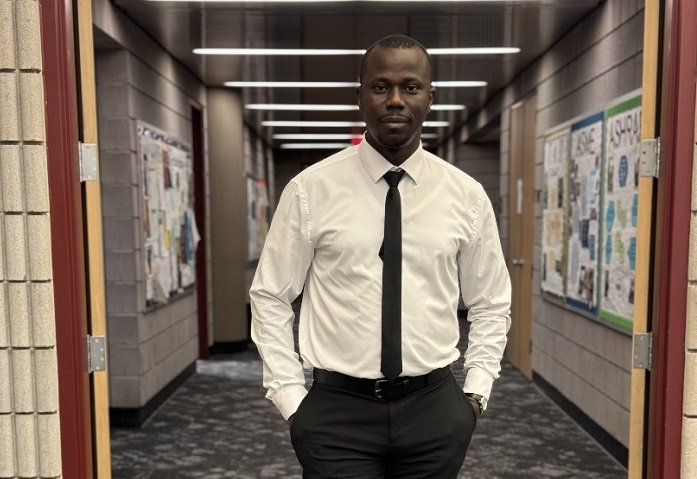News
Ghanaian Scientist Uses Math to Tackle Food Safety Risks in Online Food Delivery Era

Emmanuel Addai, a Ghanaian Ph.D. researcher specializing in Mathematical and Data-driven Modeling of infectious disease and cyber forensics at the University of Arkansas at Little Rock, has co-authored a pioneering study that reveals how the rapid growth of online food delivery services is fueling the spread of food-borne illnesses.
In the peer-reviewed article, Addai and his collaborators developed a mathematical model that incorporates both human and insect populations (particularly flies) to simulate how food safety is compromised during doorstep food deliveries.
The model uniquely uses fractional calculus (Caputo operator) to reflect real-world memory effects such as poor hygiene practices and delayed policy responses.
The study shows that:
• Asymptomatic carriers, delivery personnel, and flies are critical transmission vectors.
• Government interventions such as food safety training for restaurant staff and stricter hygiene enforcement can significantly reduce outbreaks without disrupting food delivery services.
• The model was proven stable and accurate under rigorous mathematical conditions and tested using numerical simulations in MATLAB.
By integrating public health, data science, and mathematical modeling, Addai’s work provides a policy-ready framework for managing infectious outbreaks in urban food systems.
This research aligns with global food safety goals and supports the UN Sustainable Development Goals (SDG 3, 11, and 12).
For Ghana and beyond, this research underscores the urgent need for better regulation, monitoring, and public health oversight of digital food platforms, particularly in rapidly urbanizing and densely populated cities.
As the online food delivery industry continues to grow, especially in emerging economies such as Ghana, Nigeria, Kenya, and India, the lack of standardized food safety protocols and oversight for delivery chains has emerged as a major public health risk.
Emmanuel Addai’s research provides an evidence-based mathematical framework for policymakers to anticipate and manage these risks through optimal interventions.
This work is particularly impactful for developing nations, where informal food vendors and under-regulated delivery systems often operate outside the scope of national health standards.
His model can be adapted to simulate various real-world conditions urban slums, peri-urban hubs, and even cross-border trade routes, allowing government agencies and health departments to simulate outbreak scenarios, prioritize inspection strategies, and develop early-warning systems.
Furthermore, Addai’s contribution supports Ghana’s national priorities under the Ghana Food Safety Policy and aligns with UN Sustainable Development Goals (SDGs), especially:
• SDG 3: Good health and well-being,
• SDG 11: Sustainable cities and communities,
• SDG 12: Responsible consumption and production.
Ultimately, Emmanuel Addai’s contribution stands as a critical bridge between theoretical science and practical policy application, enabling stakeholders to make data-driven decisions in regulating the fast-growing online food delivery ecosystem.
This makes his research not only nationally important to Ghana’s public health strategy but also internationally recognized as a novel methodology applicable in both low- and high-income settings.
News
Gov’t to build new public technical university in Western Region – Pres. Mahama

President John Dramani Mahama has announced that his government will build a new public technical university in the Western Region to expand access to technical and vocational education for young people.
In a speech at the Jubilee House during a courtesy call by the Paramount Chief of the Essikado Traditional Area, Nana Kobina Nketsia V, and other members of the Western Regional House of Chiefs, President Mahama said the new university forms part of a broader plan to prepare the region’s youth for emerging job opportunities in mining, oil and gas, agribusiness, and digital industries.
He explained that the technical university will be designed to meet the practical needs of industries in the region and across the country.
According to him, this move is crucial to Ghana’s long-term development goals, especially as the Western Region continues to contribute significantly to the national economy through natural resources.
“The Western Region holds immense potential to lead Ghana into a new era of industrialization and job creation. But we must equip our young people with the right skills. That is why we are building a new public technical university here” the President intimated.
He added that this new institution will work alongside other youth-focused programs, including a region-wide employment initiative focused on agri-tech, tourism, green jobs, and digital entrepreneurship.
President Mahama revealed plans to upgrade the Effia Nkwanta Regional Hospital into a modern teaching hospital that will serve as a referral center for the Western and Western North regions.
This, he said, would improve healthcare delivery and provide training grounds for medical students.
He assured the chiefs that these initiatives would help bridge development gaps and ensure that the youth in the region have better access to education, training, and jobs.
The President urged the chiefs to support these efforts by promoting peace, unity, and development in their communities.
News
Oil-producing communities in Western Region to benefit from sea defense and social projects – Prez Mahama

President John Dramani Mahama has assured that coastal communities in the Western Region affected by oil and gas activities will see direct improvements in infrastructure, sea defense, and social services under his next development agenda.
The president made it clear that the discovery of petroleum in the region must be a blessing and not a burden.
He stated that towns like Essiama and Anochie, located in the oil-producing enclaves, would benefit from better roads, bridges, schools, health facilities, and agribusiness support as part of the government’s commitment to inclusive development.
He explained that the government is expanding sea defense projects along the coast to protect fishing communities from tidal wave erosion.
These efforts, he noted are also aimed at preserving marine livelihoods and supporting the coastal economy.
President Mahama revealed that the government will establish a dedicated oil and gas services hub at the Takoradi Port through a public-private partnership.
He said the expansion of the port would include new container terminals and dry bulk facilities to boost exports and reduce delays for vessels.
He added that the (Local Content and Local Participation) Regulations, 2013 (L.I. 2204) would be strengthened to ensure young people in the Western Region gain access to petroleum jobs, contracts, and technical training.
The president also announced that the Ministry of Energy had been directed to renegotiate land arrangements with landowners around the planned petroleum hub.
He said the government will release unused portions of land back to communities and pay compensation for land that will be used, starting with 5,000 hectares instead of the initially acquired 20,000 hectares.
He stressed that oil wealth must translate into better living conditions for the people whose lands and livelihoods are affected by exploration and production activities.
Jacob Aggrey














